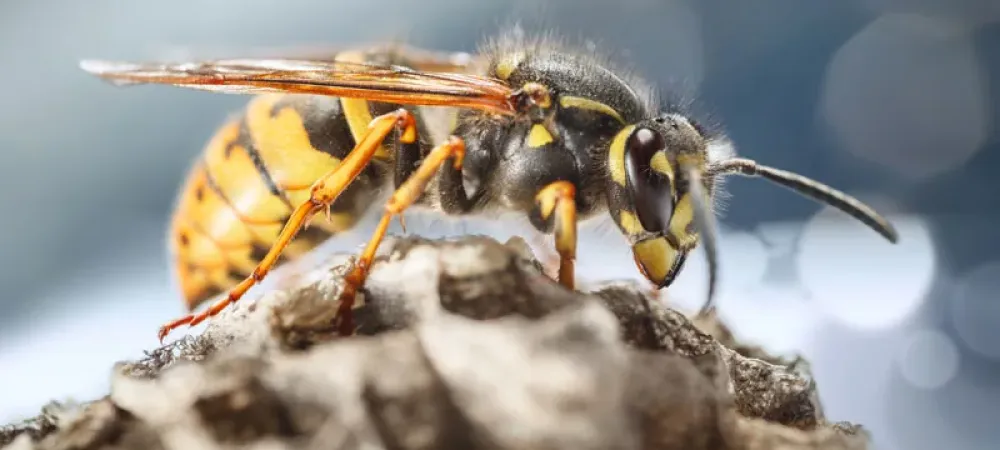How Dangerous Are Wasps In Denver?

Pretty much everyone can identify a wasp, and when they see one buzzing around, they tense up. It is also likely that you've probably been stung by one. These are common insects. The goal of this article is not to tell you that wasps sting or that being stung by a wasp hurts like crazy. We're going to take a look at the danger of wasps in a way you may have never considered. Here's what every Denver homeowner should know about wasps.
If You Don't Have Wasps, You Won't Get Stung
This is fairly straightforward. A wasp isn't dangerous at all if you don't have any wasps in your yard. Unfortunately, it is impossible to have a wasp-free yard, nor should you want one. Wasps are beneficial insects that help with pollination, and they also hunt spiders. More than this, a wasp isn't going to present much of a threat to you when it is foraging for food. If you don't take wild swings at it, it's not likely to sting you.
All Wasps Aren't Created Equal
Which wasps are dangerous? Are you aware that some wasps present more of a danger to you than others? We have many wasp species in Denver, but they can be divided into two categories: Social wasps and solitary wasps.
- Social Wasps — These are the wasps to watch out for. Yellow jackets and paper wasps are examples of this kind of wasp. Why are they dangerous? Because they have a nest-protection instinct that causes them to gather together into a swarm and make you regret getting near their nest.
- Solitary Wasps — These wasps are not as concerning as social wasps. Cicada killer wasps, mud daubers, and other solitary wasps do not have a nest-protection instinct, and they don't work together. Usually, stings from this type of wasp happen by accident. You may sit in a lawn chair and instantly regret it. But you're never going to be chased through your yard, screaming and flailing your arms.
When Wasps Make Nests
If you have wasps in your yard, and those wasps are social wasps, the next level of danger is the establishment of a nest. A paper wasp nest that is hidden in a bush or under the overhang of your home can surprise you when you least expect it, and a yellow jacket nest in a ground hole can be agitated when you mow your grass. It is best not to allow wasps to create nests in your yard.
There are a few ways you can do this:
- Catch aerial paper nests early and remove them with a broom during the day when the queen wasp is out collecting material. These start-up nests will look like an umbrella shape and may be found in brush or sheltered locations.
- Fill in ground holes, remove objects from your yard that don't need to be there, and seal openings in your home's exterior. This will resist yellow jackets.
- Remove standing water from your yard to reduce the water sources that attract all insects, including wasps.
- Remove sweet-smelling things.
- Keep bagged trash in sealed containers. Wasps can find sweets and meats inside your trash.
Another way to prevent nest creation is to invest in a residential pest control program. When you have routine visits and inspections from a licensed professional, the threat of having a nest on your property is significantly reduced.
When Wasps Sting
Now that we've taken a look at how wasps can be a danger in your yard let's consider a few facts regarding their ability to sting.
- Wasps don't have a barbed stinger. That means they can sting you more than once. A handful of wasps can cause you quite a bit of misery.
- Yellow jackets can be very aggressive. They are known to give chase for several yards and even go around obstacles. If you're being chased, we don't recommend jumping into a pool or some other body of water. A yellow jacket can stay aggressive a lot longer than you can hold your breath.
- Most wasp stings will only result in a painful welt, but it is possible to have an allergic reaction. This can cause serious and even life-threatening symptoms. The worst part about stinging insect allergies is that they can develop later in life due to medical conditions and other factors.
In the end, if you're dealing with wasps, it's best to reach out to a company that offers customized pest control in Denver. At Advantage Pest Management, we have a solution for you.
What To Do About Wasps In Denver
It is okay to have wasps visit your property, but to prevent the establishment of nests, consider home pest control from Advantage Pest Management. We offer year-round pest control services in Denver that provide routine visits from a licensed service professional. We can catch threats early and prevent wasps from being a danger to you and your family. Reach out to us today to learn more.
